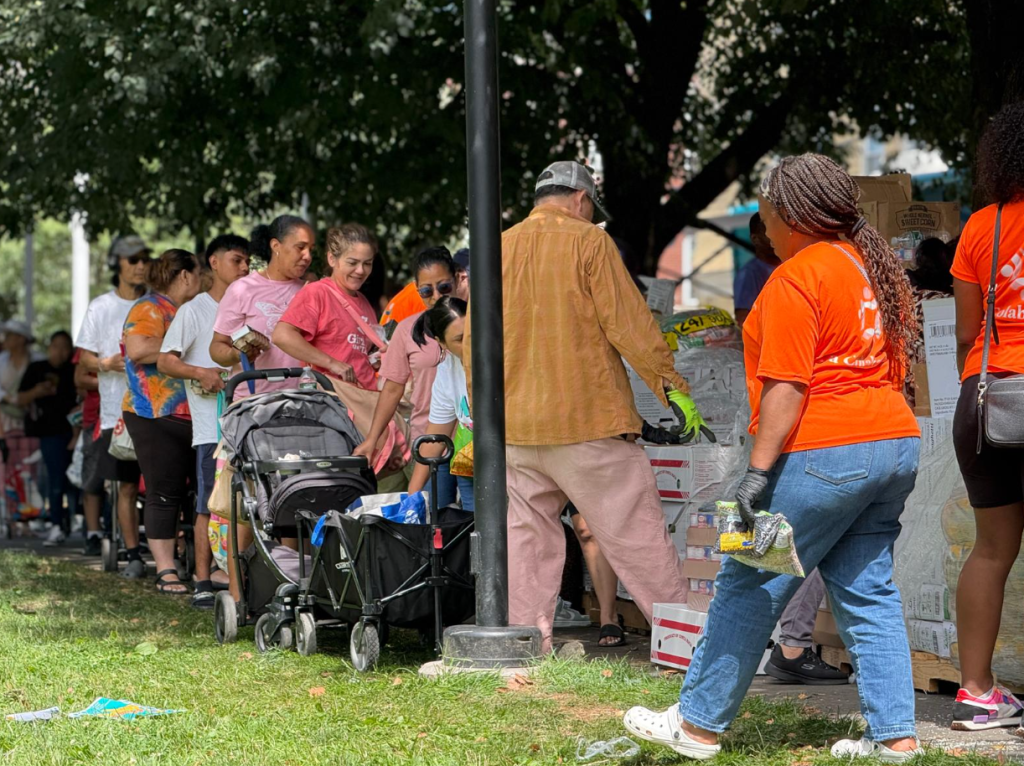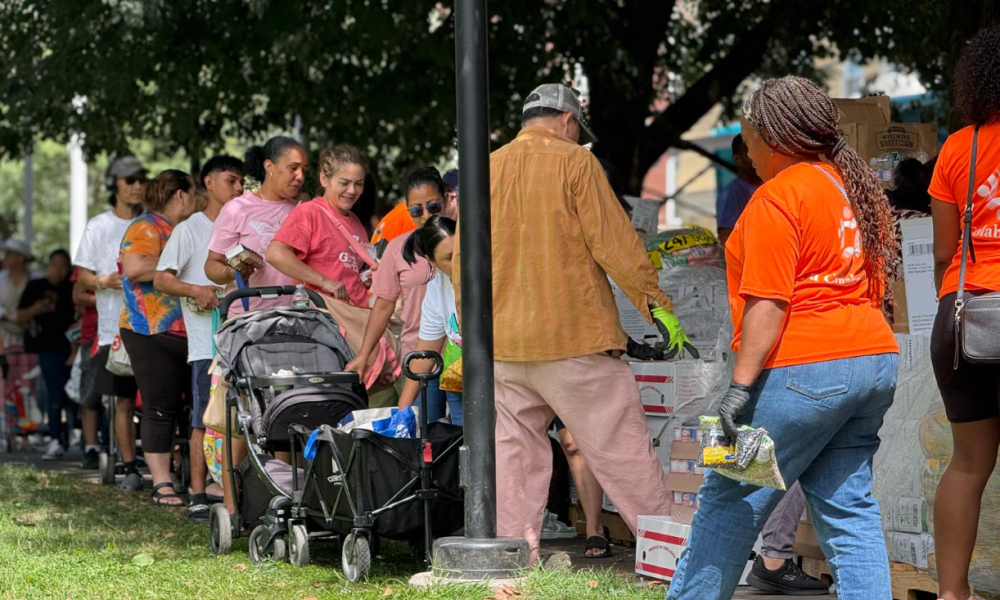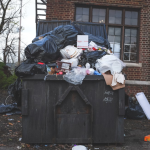La Colaborativa: the heart of Chelsea’s immigrant resilience

Photo contributed by Celine Hoffens.
With beaming smiles and dressed in bright orange La Colaborativa shirts, a group of staff members hand out bags filled with potatoes, bread, and other essential groceries. As the line progresses, the staff passes out blue flyers packed with resources for housing, healthcare, legal aid and more. Each one is a small lifeline for the families gathered there.
Chelsea, Mass., founded in 1739, has become home to a largely Latino population in the early 2000s, with a Hispanic population of 65%. Hispanic immigrants have continued to settle in Chelsea for its low-cost family housing and its accessibility to jobs, some of which are in the industry. Chelsea has been historically known as a city with a hardworking population, according to Globalboston.edu.
La Colaborativa, founded in 1988 in Chelsea, is a Latina-led organization that has served as a lifeline for immigrant families, uplifting the community and operating in other cities like East Boston and Revere. The organization was created in response to unmet needs in the community, focusing on tackling issues like food insecurity, housing, youth development and more.
La Colaborativa’s core mission is to “empower immigrant families while advocating for equity and justice,” according to La Colaborativa’s website.
Kimberly Ayala, a Chelsea resident and volunteer at the youth program at the organization, recalled a housing protest that left a lasting impression on her.
“We went to an apartment complex. The conditions were really bad, leaking through the floors, roofs, and a roach infestation,” Ayala said. “We gave testimonies, I gave a testimony, we were outside protesting.”
The rally held in April 2024 focused on housing conditions in a Hispanic-majority apartment complex on Broadway in Chelsea. Ayala recalled that the protest was to show the people living there that they were not alone and that La Colaborativa was there to help if they needed it. She said it was about standing up for the community, which is what Colaborativa is all about.
The organization has continuously served as a source for Chelsea residents, especially in times of crisis. Once labeled a Covid-19 “hotspot” in 2021, Chelsea soon became one of the most vaccinated cities in the state with the help of organizations like Colaborativa, according to LaColaborativa.org.
Colaborativa became a hub for food distribution, testing and vaccination, all done through strategies like door knocking. This effective strategy of door knocking has not stopped.
“We did a lot of door knocking to give out information and tell people to vote,” Ayala said.
The organization also offers food and resources at least twice a week. On July 18th, I visited one of these events at Quigley Park, where parents waited in line while their children played on the blue slides nearby. A Massachusetts General Hospital (MGH) care van was parked right in front of the events, offering health resources and support.
A local Chelsea resident, from Guatemala, stood in line with a cart and said in Spanish, “This helps a lot. I come here once a month.” A food pantry volunteer expressed how helpful the pantry has been, “It takes care of everything but the meat and some of them do take care of the meat, and all the workers are excellent, nicely organized, no fights, people with smiles.”
As some staff members handed out food, others handed out flyers. One of the workers invited residents to a meeting to reflect and discuss next steps to take once Temporary Protected Status (TPS) goes away. The organization has seen an increase in visitors, as many in the Hispanic community are feeling scared and alone given the current political climate, an increase of ICE presence and growing tensions within the community.
The Chelsea community sees La Colaborativa as one of their own. Staff members are known for their kindness, providing cardboard boxes to those without bags or carts, greeting everyone with a smile and warm words like “Amor,” and often saying, “God bless you.” The atmosphere they create is one of care and safety.
Kimberly Ayala said that La Colaborativa’s support does not stop at handing out food; they follow up with residents to make sure their needs are being met. Both a Chelsea resident and food pantry volunteer said they first came to the organization because of a friend’s recommendation. Now, residents continue to go and spread the word about La Colaborativa’s work and aid because of the “loving, supportive staff.”
Over the years, La Colaborativa has become more than just a place to get help. It feels like family to many in Chelsea; whether it’s through protests, food events, youth programs or just friendly faces handing out flyers, the group has built trust with the community.
In a city full of immigrant stories, La Colaborativa makes it their mission to remind people that they are not alone. When someone needs help, La Colaborativa is often the first place they turn to and the first place they tell their friends about.
To learn more about La Colaborativa’s work and mission, visit their Instagram at @la_colaborativa.










